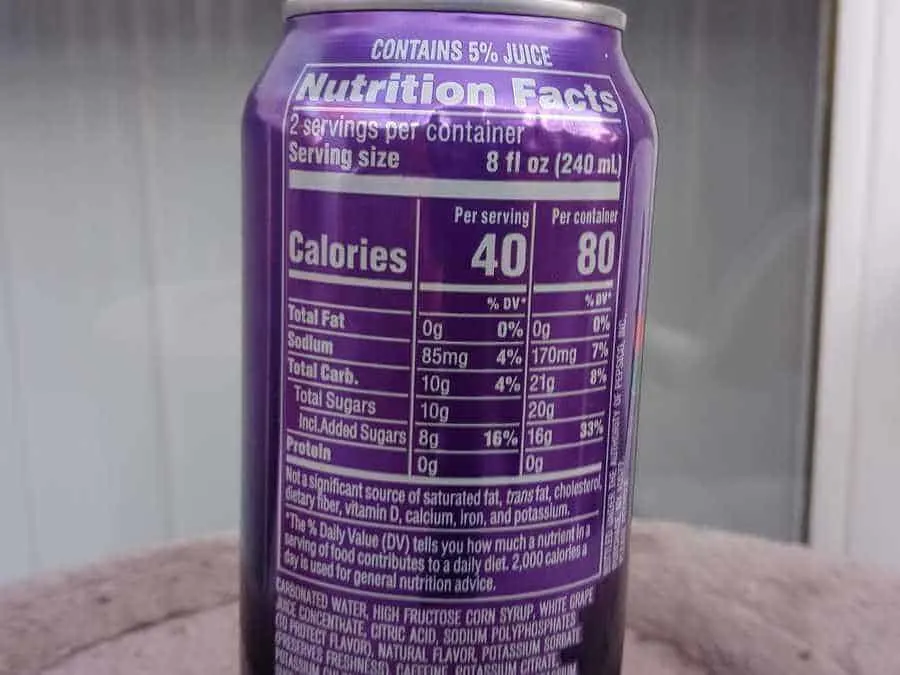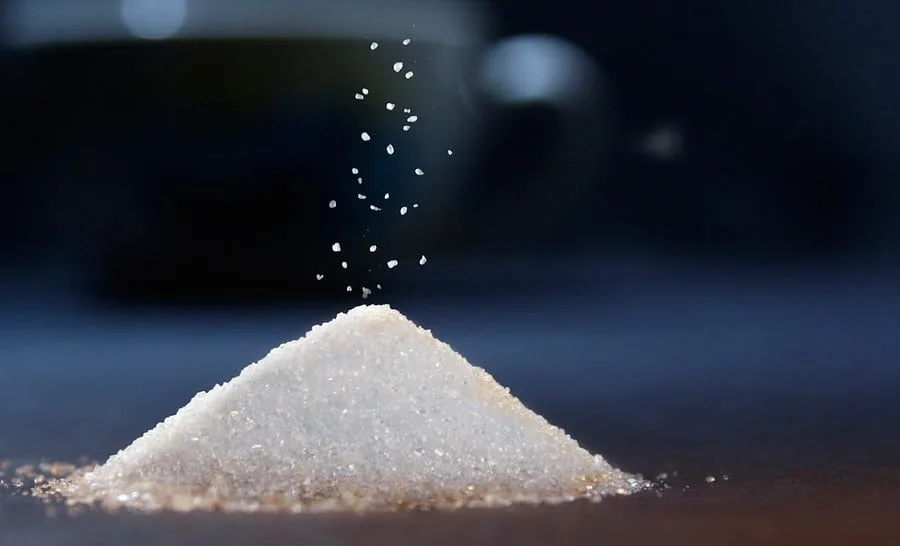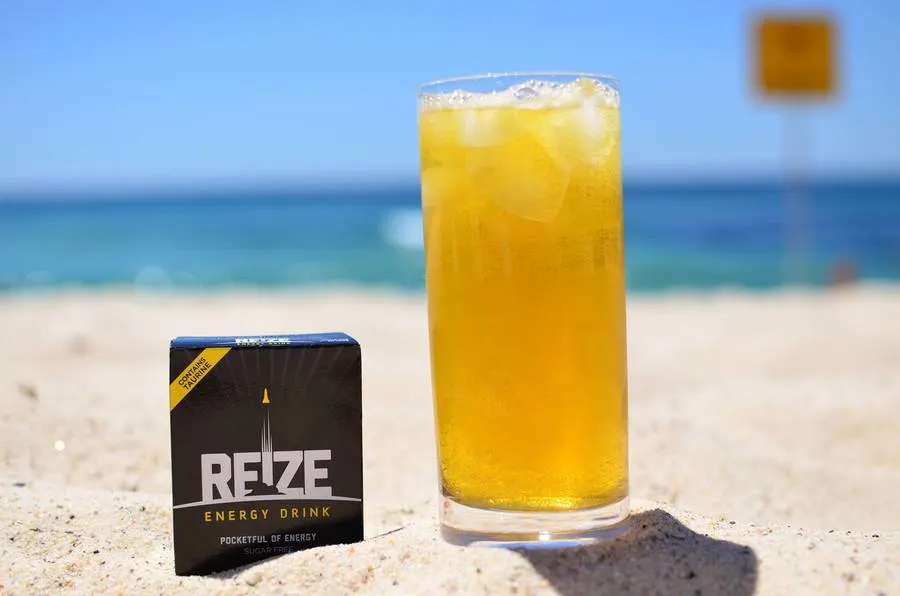Brought to you by the same company that started Mountain Dew, a soda that’s popular internationally, Mountain Dew Kickstart is the energy drink version that aims to provide you with a great boost.
You might be wondering if it’s worth trying Mountain Dew Kickstart and if it’s good for you.
Short answer: Mountain Dew Kickstart does work as an energy drink. Kickstart has a moderate caffeine content that gives you a quick energy boost. However, Mountain Dew Kickstart is fairly expensive for an energy drink and isn’t the healthiest energy drink out there either.
For a more detailed review, continue reading as I provide a detailed breakdown of all the ingredients and nutrition information in Mountain Dew Kickstart and help you decide for yourself whether it’s worth adding to your diet or not.
Let’s dive in…
Mountain Dew Kickstart Nutrition Facts

| Typical Value (Standard Serving) | Mountain Dew Kickstart (16 fl.oz) | Red Bull (12 fl.oz) | Monster (16 fl.oz) |
| Energy | 80 calories | 160 calories | 240 calories |
| Protein | 0g | <1g | 2.28g |
| Carbohydrate (Of which sugars) | 21g (20g) | 40g (39g) | 60g (55g) |
| Sodium | 170mg | 150mg | 370mg |
| Caffeine | 90mg | 114mg | 160mg |
How Many Calories Are In Mountain Dew Kickstart?
A 16 fl. oz can of Mountain Dew Kickstart has 80 calories, which is fairly reasonable for an energy drink.
The number of calories in Mountain Dew Kickstart is mainly attributable to its sugar content. In my opinion, it’s not so bad as there are many other energy drinks with the same serving volume that contain around twice as many calories as Kickstart.
Still, there’s no harm in limiting your intake of Mountain Dew Kickstart, especially if you’re on a diet.
For reference, the recommended daily caloric intake for healthy adults is between 1,600 calories – 2,400 calories per day for women and 2,000 calories – 3,000 calories each day for men.
Though it may seem like Mountain Dew Kickstart won’t contribute much to your daily calorie count, if you aren’t mindful of how much you’re consuming, you might consume more calories than you should.
A high-calorie diet can lead to a number of health problems like weight gain, diabetes, and heart disease.
If you’re someone who leads an active lifestyle, you won’t have many issues burning off the calories you get from Mountain Dew Kickstart, but if you’re not so active then perhaps you’d benefit from zero-calorie energy drinks instead.
For more information about the best zero-calorie energy drinks, check out my other article on the topic here.
Mountain Dew Kickstart Ingredients
Every 16 fl.oz can of Mountain Dew Kickstart (Midnight Grape) contains:
- Carbonated Water
- High fructose corn syrup
- White grape juice concentrate
- Citric acid
- Sodium polyphosphates (preservative)
- Natural flavor
- Potassium sorbate (preservative)
- Caffeine (90mg)
- Potassium citrate
- Potassium chloride
- Gum Arabic
- Acesulfame potassium (artificial sweetener)
- Sucralose (artificial sweetener)
- Red 40 (coloring)
- Calcium disodium EDTA
- Sucrose acetate isobutyrate
- Salt
- Blue 1 (coloring)
How Much Caffeine Is In Mountain Dew Kickstart?

Every 16 fl.oz can of Mountain Dew Kickstart has 90mg of caffeine which is comparatively low compared to some other stronger energy drinks of the same serving size like Bang and Reign.
Though Mountain Dew Kickstart may not be the strongest energy drink on the market, it’ll certainly supply a boost that will keep you alert and awake for a few hours.
My personal caffeine preference is between 50mg – 100mg per drink, so Kickstart has an ideal amount of caffeine in my opinion. I find that if I have too much caffeine in a day, I can sometimes get overwhelmed by several unpleasant side effects.
That said, 90mg of caffeine may be the right amount of caffeine for you, depending on your caffeine metabolism.
However, if you’re accustomed to a high caffeine intake on a regular basis, Mountain Dew Kickstart might not offer quite the kick that you’re looking for. So, the perfect amount of caffeine for you is largely a personal choice.
But don’t forget to keep track of how much caffeine you consume on any given day. The FDA recommends that healthy adults should limit their intake to no more than 400mg of caffeine per day, and this total includes caffeine from all sources.
Keep in mind that coffee, tea, sodas and even chocolate contain varying amounts of caffeine. Try to be aware of how much you’re having so you can be careful not to have too much.
Excessive consumption of caffeine could lead to a caffeine overdose and negative health impacts like:
- Anxiety
- Insomnia
- Digestive issues
- Muscle breakdown
- High blood pressure
- Addiction
- Fatigue
I recommend only drinking Mountain Dew Kickstart a maximum of once per day. Mountain Dew Kickstart is probably also a better choice as an occasional drink rather than as a daily one.
I explore more about whether you can drink Mountain Dew Kickstart every day in this article here.
How Much Sugar Is In Mountain Dew Kickstart?
There’s 20g of sugar in each 16 fl. oz can of Mountain Dew Kickstart.
The AHA recommends a maximum daily sugar intake of no more than 36g for men and 25g for women.
Mountain Dew Kickstart comes close to the daily sugar limit but if you compare it to its counterparts like Red Bull and Monster, the sugar in Mountain Dew Kickstart doesn’t seem like a lot.
Excessive consumption of sugar over an extended period of time isn’t beneficial for your health and could lead to many adverse effects like:
- Weight gain
- Heart disease
- Diabetes
- Depression
- Low energy levels
You could also possibly end up with a sugar crash once the energy-boosting effects of Mountain Dew Kickstart wear off, which may leave you feeling sluggish and tired.
The main source of sugar in Mountain Dew Kickstart comes from the presence of high fructose corn syrup. Like sugar, it poses a high risk of health issues if consumed in large amounts over the long-term.

You can learn more about the effects of sugar in this video:
Does Mountain Dew Kickstart Have Artificial Sweeteners?
Mountain Dew Kickstart contains the artificial sweeteners sucralose and acesulfame potassium in addition to high fructose corn syrup, so be prepared for a strong sweet taste from Kickstart.
These sweeteners are FDA-approved, so there’s no need to be concerned if you consume them in moderation.
Personally, I think the sugar content in Mountain Dew Kickstart is more worrying than the presence of these artificial sweeteners.
It isn’t all that common to see energy drinks use both sugar and also artificial sweeteners. Most brands choose one or the other, but Kickstart makes use of both which I’m not really a fan of.
Does Mountain Dew Kickstart Work?
With 90mg of caffeine, Mountain Dew Kickstart offers a great energy boost though the sugar content may be a cause of concern in the long run.
With most of the boost coming from the caffeine and sugar, Mountain Dew Kickstart has you covered with a decent energy boost that will likely last for several hours.
But since Mountain Dew Kickstart does have a fair amount of sugar, you might also have to deal with a sugar crash after the effects begin to wear off.
Mountain Dew Kickstart isn’t exactly healthy in my opinion, but if you’re in need of something that’ll give you some energy with great taste, Mountain Dew Kickstart can give you that.
Is Mountain Dew Kickstart Bad For You?
Mountain Dew Kickstart isn’t terribly bad for your health, but it isn’t the healthiest energy drink on the market either, especially if you take into account the amount of sugar that it has.
| Mountain Dew Kickstart (16 fl. oz) | Daily Max Limit (Female/Male) | |
| Calories | 80 calories | 2400 calories/3000 calories |
| Caffeine | 90mg | 400mg |
| Sugar | 20g | 25g/36g |
Too much sugar over the long run could spell trouble for you as it could cause a number of health problems, and you certainly don’t want that from an energy drink.
Furthermore, Mountain Dew Kickstart contains high fructose corn syrup, or HFCS, which isn’t good for your health, since it could cause metabolic dysregulation and damaging effects if consumed in excess.
I wouldn’t say you can’t drink Mountain Dew Kickstart at all. It also isn’t a crime to exceed the daily sugar limit once in a while, but you shouldn’t do it too often.
Like all energy drinks, you should consume Mountain Dew Kickstart in moderation.
Mountain Dew Kickstart Flavors
There are nine flavors for Mountain Dew Kickstart:
- Original Dew
- Orange Citrus
- Black Cherry
- Midnight Grape
- Fruit Punch
- Mango Lime
- Pineapple Orange Mango
- Bluberry Pomegranate
- Raspberry Citrus
Mountain Dew Kickstart discontinued/region-specific flavors:
- Ultra (sugar-free version)
- Blood Orange
- Watermelon
- Limeade (only available in Australia)
- Strawberry Kiwi

What Does Mountain Dew Kickstart Taste Like?
Mountain Dew Kickstart shares a similar taste to regular Mountain Dew, just that it provides you with a stronger energy boost compared to the soda version. If you like Mountain Dew, you’ll also like Kickstart too.
As I mentioned before, Mountain Dew Kickstart energy drink is fairly sweet thanks to the inclusion of both sugar and artificial sweeteners.
If you’re a fan of fruity flavors, Mountain Dew Kickstart has a wide selection of fruit-based flavors that you can try, plus it even has fruit concentrates in it to make it taste more authentic and similar to the real fruit.
Kickstart has a strong fizziness, but it goes down well and the extra sugar provides for a temporary dopamine rush that your taste buds will approve of.
Mountain Dew Kickstart is a great choice if you like a moderate energy boost with a little more sweetness to it, but if you aren’t a fan of sugar you probably won’t like it much.
Mountain Dew Kickstart Price
Based on my search on Amazon, a 12-pack of 16 fl. oz cans of Mountain Dew Kickstart costs around $26. That means the price of a single 16 fl. oz can of Mountain Dew Kickstart is around $2.
Mountain Dew Kickstart can be found in most of your local stores. You can also purchase them from their official website. Online retailers and Amazon or eBay often sometimes have great deals for energy drinks too, so you may want to check them out and compare prices before buying some.
Personally, I feel that the price of Kickstart is a touch expensive since it doesn’t have lots of caffeine or many special ingredients like amino acids or vitamins, though it isn’t the priciest energy drink around either.
Depending on your preference, you may be able to find cheaper energy drinks that offer a great energy boost with plenty of beneficial ingredients too.
Mountain Dew Kickstart Review (7 Out Of 10)
In my opinion, I give Mountain Dew Kickstart a 7 out of 10 for its caffeine content, calorie content, and great taste.
Some of the reasons Mountain Dew Kickstart didn’t score higher is due to the sugar content and price.
For some people, 20g of sugar might not be an issue, but for me, it’s cutting a little too close to the maximum recommended daily sugar allowance.
The price for a can of Mountain Dew Kickstart is also a little too costly, particularly since there are many other more affordable energy drinks out there that are packed with great ingredients.
However, in terms of flavor and energy boost, I don’t have any complaints whatsoever. Mountain Dew Kickstart has a wide range of flavors for you to choose from and the energy boost isn’t overwhelming, which I like.
Mountain Dew Kickstart Alternatives
Mountain Dew Kickstart tastes great, but there are plenty of other awesome energy drink options out there if Mountain Dew Kickstart doesn’t tickle your fancy.
Here’s a quick list to get you started:
- Red Bull
- Monster
- Rockstar
- Xyience
- Bang
- Bing Energy Drink
- C4 Energy
- 3D Energy Drink
- NOS
- Game Fuel
- Adrenaline Shoc
- Full Throttle
Powdered energy drinks make great choices too, as you can adjust your serving size to your preference and taste. They’re also usually more affordable than the ready-to-drink options listed above:
- G Fuel Powder
- Advocare Spark
- Zipfizz
- REIZE (my fav)
REIZE (10 Out Of 10)

Mountain Dew Kickstart might be good, but how about something more convenient, versatile and affordable? REIZE is a great powdered energy drink that comes in convenient 4g sachets, making it easy to take with you wherever you go.
With a sensible 50mg of caffeine per serve, REIZE is completely sugar-free and has just 11 calories. That’s awesome.
REIZE also contains a smart mix of healthy ingredients such as taurine, ginseng, and B vitamins that work together to provide you with the perfect energy boost, without the crash afterwards.
Best of all, REIZE ships straight to your door for only around $1 per drink, including shipping, which makes it a lot more affordable than Mountain Dew Kickstart.
Try REIZE today and I’m sure you’ll agree that it’s a smarter choice than Mountain Dew Kickstart.

